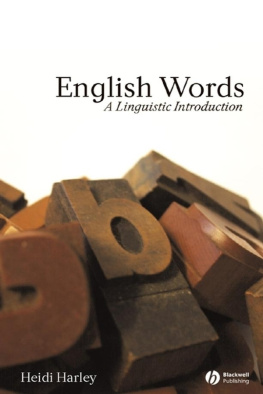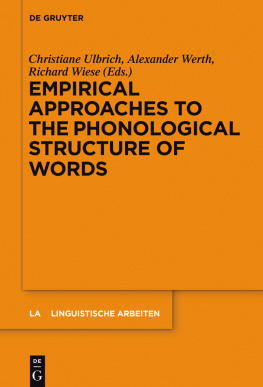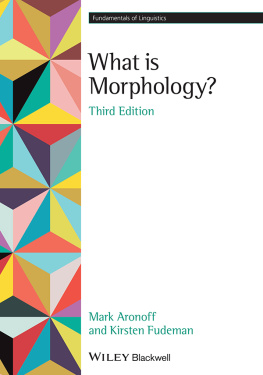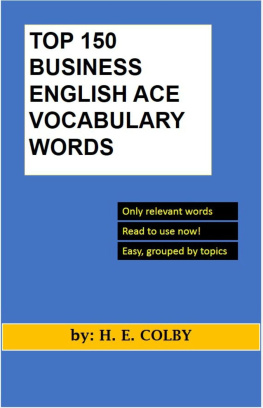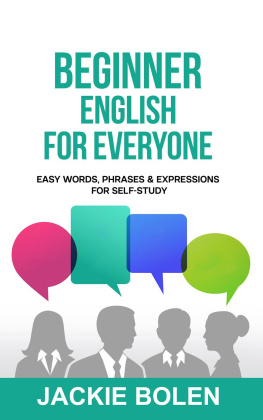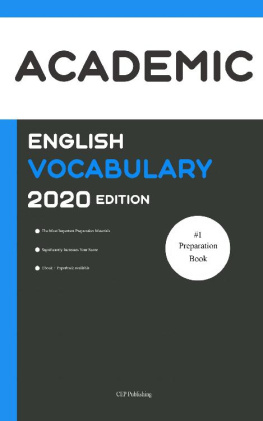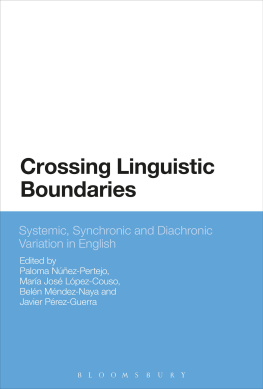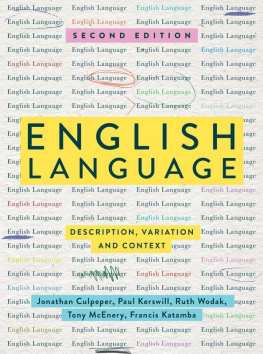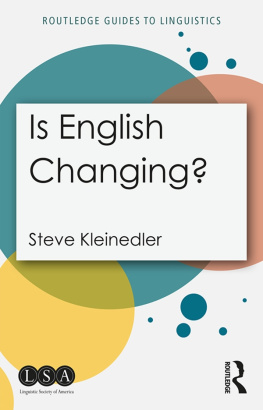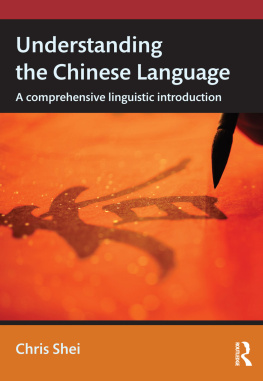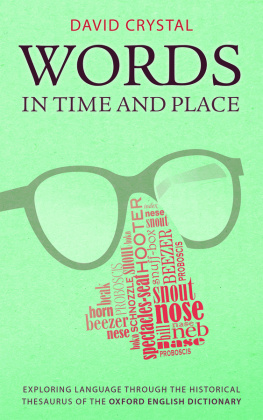
Table of Contents
List of Tables
- 2 Sound and Fury: English Phonology
- 9 Accidents of History: English in Flux
List of Illustrations
- 1 What Is a Word?
- 2 Sound and Fury: English Phonology
- 3 Phonological Words: Calling All Scrabble Players!
- 6 Morphological Idiosyncrasies
- 7 Lexical Semantics: The Structure of Meaning, the Meaning of Structure
- 8 Children Learning Words
- 9 Accidents of History: English in Flux
Guide
Pages
THE LANGUAGE LIBRARY
Series editor: David Crystal
The Language Library was created in 1952 by Eric Partridge, the great etymologist and lexicographer, who from 1966 to 1976 was assisted by his co-editor Simeon Potter. Together they commissioned volumes on the traditional themes of language study, with particular emphasis on the history of the English language and on the individual linguistic styles of major English authors. In 1977 David Crystal took over as editor, and The Language Library now includes titles in many areas of linguistic enquiry.
The most recently published titles in the series include:
Ronald Carter and Walter Nash Seeing Through Language
Florian Coulmas The Writing Systems of the World
David Crystal A Dictionary of Linguistics and Phonetics, Fifth Edition
J. A. Cuddon A Dictionary of Literary Terms and Literary Theory, Fourth Edition
Viv Edwards Multilingualism in the English-speaking World
Geoffrey Hughes A History of English Words
Walter Nash Jargon
Roger Shuy Language Crimes
Gunnel Tottie An Introduction to American English
Ronald Wardhaugh Investigating Language
Ronald Wardhaugh Proper English: Myths and Misunderstandings about Language
Heidi Harley English Words: A Linguistic Introduction
English Words
A Linguistic Introduction
Heidi Harley
2006 by Heidi Harley
BLACKWELL PUBLISHING
350 Main Street, Malden, MA 02148-5020, USA
9600 Garsington Road, Oxford OX4 2DQ, UK
550 Swanston Street, Carlton, Victoria 3053, Australia
The right of Heidi Harley to be identified as the Author of this Work has been asserted in accordance with the UK Copyright, Designs, and Patents Act 1988.
All rights reserved. No part of this publication may be reproduced, stored in a retrieval system, or transmitted, in any form or by any means, electronic, mechanical, photocopying, recording or otherwise, except as permitted by the UK Copyright, Designs, and Patents Act 1988, without the prior permission of the publisher.
First published 2006 by Blackwell Publishing Ltd
3 2007
Library of Congress Cataloging-in-Publication Data
Harley, Heidi.
English words : a linguistic introduction / Heidi Harley.
p. cm. (The language library)
Includes bibliographical references and index.
ISBN: 978-0-631-23031-1 (alk. paper)
ISBN: 978-0-631-23032-8 (pbk. : alk. paper)
1. English languageWord formation.
2. English languageMorphology. 3. English languagePhonology. 4. English languageSemantics. I. Title. II. Series.
PE1175.H43 2006
425dc22
2005028556
A catalogue record for this title is available from the British Library.
Set in 10/12 1/2 pt Palatino
by Graphicraft Limited, Hong Kong
Printed and bound in Singapore
by C.O.S. Printers Pte Ltd
The publishers policy is to use permanent paper from mills that operate a sustainable forestry policy, and which has been manufactured from pulp processed using acid-free and elementary chlorine-free practices. Furthermore, the publisher ensures that the text paper and cover board used have met acceptable environmental accreditation standards.
For further information on
Blackwell Publishing, visit our website:
www.blackwellpublishing.com
This book is dedicated to my father, Peter Harley, who takes words seriously.
Preface
This textbook is intended as a thorough introduction to the study of English words from a linguistic perspective. It introduces students to the technical study of words in several areas: phonology, morphology, syntax, semantics, language acquisition and historical linguistics, in that order. Some introductory material is covered in each section, to give students the theoretical tools they will need to proceed, and then those tools are employed to analyze the English vocabulary.
This book will be of interest to students who have a general interest in words people whom Richard Lederer smilingly calls verbivores. They enjoy reading tidbits of word facts in language mavens columns, word games and etymologies, but have never taken a linguistics or structure of language course.
The text is designed to give students a command of the basic theory in each area, skill in analyzing and understanding English words, and the grounding needed for more advanced study in linguistics or lexicology. Ultimately, however, the aim is to provide students who will never take another linguistics-related course with a grasp of some of the basic methods and questions of the field, viewed through the window of words.
Acknowledgments
This book would not have been possible without the help of a great many people. It wouldnt exist had Andrew Carnie not suggested that I submit a proposal for it, building on my lecture notes for the cross-listed Linguistics/English 322 course, The Structure and Meaning of Words. My students and colleagues at the University of Arizona provided invaluable feedback and expertise in many moments of uncertainty. I would especially like to thank Michael Hammond, Adam Ussishkin, Diane Ohala and Andrew Carnie for reading and commenting on portions of the manuscript. Several teaching assistants I have had over the years also provided feedback, including Bob Kennedy, Jason Haugen, Sarah Longstaff, Gwanhi Yun and Xu Xu. Thanks especially to Xu Xu for preparing the IPA transcription key. The three anonymous reviewers of the manuscript for Blackwell provided exhaustive comments that improved it considerably and also saved me from many mistakes; I am very grateful to them. The linguistics editors at Blackwell, first Tami Kaplan and then Sarah Coleman and Ada Brunstein, have exhibited a combination of patience, persistence and tact that both reassured and motivated a fairly skittish author. I also have very much appreciated Sarahs and Margaret Ahernes guidance and hard work throughout the publication process.
Last but far from least, both my parents, Carolyn and Peter Harley, read through the entire first draft manuscript and provided detailed comments that have helped me no end. My husband, Art Torrance, read through the manuscript not once, but twice, thinking through each analysis and transcription, paying sharp attention to every comma and apostrophe, and saving future students from a great deal of unnecessary confusion. He also has supported me throughout the process with encouragement, snacks and late-night cups of hot chocolate. I cannot express my gratitude to him and them enough.
Needless to say, the many flaws that doubtless remain are entirely my responsibility!
Heidi Harley
April, 2005
IPA Transcription Key
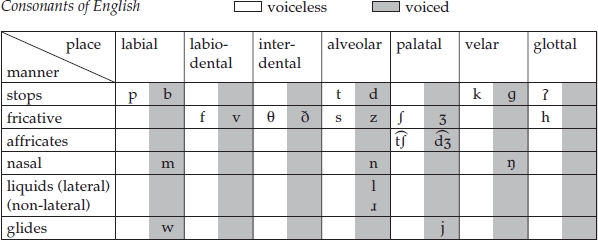 Next page
Next page
